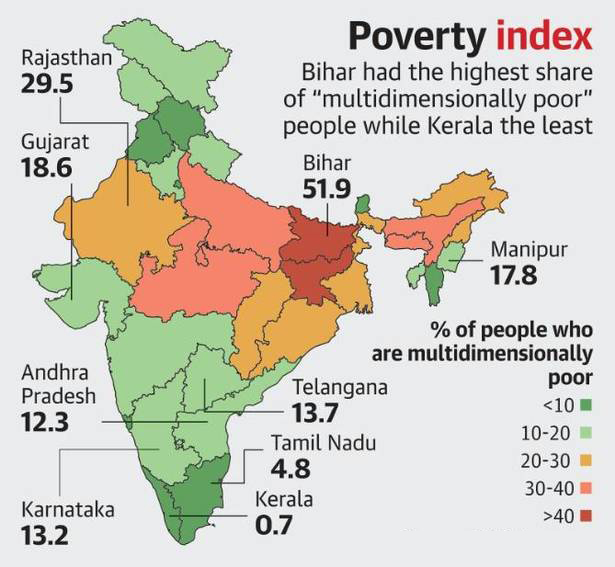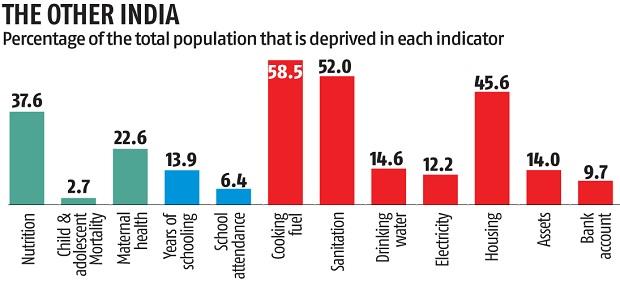Social Justice
National Multidimensional Poverty Index: NITI Ayog
- 30 Nov 2021
- 5 min read
Why in News
Recently, NITI Aayog has released the Multidimensional Poverty Index (MPI).
- Earlier, Global Multidimensional Poverty Index 2021 was released by the United Nations Development Programme (UNDP) and the Oxford Poverty & Human Development Initiative (OPHI).
Key Points
- About:
- The MPI seeks to measure poverty across its multiple dimensions and in effect complements existing poverty statistics based on per capita consumption expenditure.
- According to Global MPI 2021, India’s rank is 66 out of 109 countries. The National MPI is aimed at deconstructing the Global MPI and creating a globally aligned and yet customised India MPI for drawing up comprehensive Reform Action Plans with the larger goal of improving India’s position in the Global MPI rankings.
- It has three equally weighted dimensions – health, education, and standard of living.
- These three dimensions are represented by 12 indicators such as nutrition, school attendance, years of schooling, drinking water, sanitation, housing, bank accounts among others.
- Methodology & Data:
- The national MPI measure uses the globally accepted and robust methodology developed by the Oxford Poverty and Human Development Initiative (OPHI) and the UNDP.
- This baseline report of the national MPI measure is based on the reference period of 2015-16 of the National Family Health Survey (NFHS-4).
- NFHS-4 data has been used to derive an idea of baseline multidimensional poverty to know the situation on ground before the full rollout of various central government schemes.
- NFHS-4 precedes the full roll out of (central government’s) flagship schemes on housing, drinking water, sanitation, electricity, cooking fuel, financial inclusion, and other major efforts towards improving school attendance, nutrition, mother and child health, etc.
- However, it has to be noted here that the NFHS-5 data suggests improvement in access to clean cooking fuel, sanitation, and electricity which translates to reduction in deprivation.
- Findings of the Index:
- Poverty Levels:
- Bihar has the highest proportion of people of the state’s population followed by Jharkhand and Uttar Pradesh who are multidimensionally poor.
- Kerala registered the lowest population poverty levels, followed by Puducherry, Lakshadweep, Goa and Sikkim.
- Malnourished People:
- Bihar also has the highest number of malnourished people followed by Jharkhand, Madhya Pradesh, Uttar Pradesh, and Chhattisgarh.
- Poverty Levels:
- Significance of the Index:
- Contribution towards Instituting Public Policy Tool:
- The development of the Index is an important contribution towards instituting a public policy tool which monitors multidimensional poverty, informs evidence-based and focused interventions, thereby ensuring that no one is left behind.
- Presents Overall Picture of Poverty:
- This presents an overall picture of poverty in the country, while also enabling closer and more in-depth analyses of areas of interest such as regions – state or districts, and specific sectors and complements the existing monetary poverty statistics.
- Help Achieving SDGs Goals:
- It is a contribution towards measuring progress towards target 1.2 of the Sustainable Development Goals (SDGs) which aims at reducing “at least by half the proportion of men, women and children of all ages living in poverty in all its dimensions.
- Contribution towards Instituting Public Policy Tool:
- Related Government Initiatives:
- National Rural Livelihood Mission (NRLM)
- The Mahatma Gandhi National Rural Employment Guarantee Act 2005 (MNREGA)
- Pradhan Mantri Awaas Yojana-Gramin (PMAY-G)
- Public Distribution System (PDS)
- Pradhan Mantri Awas Yojana (PMAY)
- Jal Jeevan Mission (JJM)
- Swachh Bharat Mission (SBM)
- Pradhan Mantri Sahaj Bijli Har Ghar Yojana (Saubhagya)
- Pradhan Mantri Ujjwala Yojana (PMUY)








